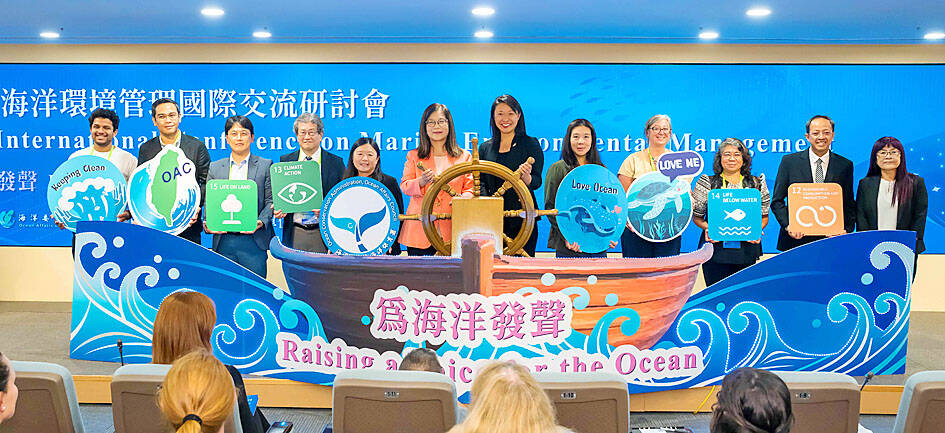Ocean Affairs Council Minister Kuan Bi-ling (管碧玲) yesterday condemned Chinese fishers for using cyanide and urged them to respect the UN Convention on the Law of the Sea (UNCLOS).
Speaking to reporters after the International Conference on Marine Environmental Management in Taipei, Kuan made the remarks following the seizure of a Chinese vessel carrying cyanide by the Coast Guard Administration for illegally operating near the Pratas Islands (Dongsha Islands, 東沙群島) in the South China Sea.
Cyanide fishing involves spraying a sodium cyanide mixture into a habitat to stun fish for capture. The practice harms not only the target species, but also other marine organisms, including coral reefs.

Photo courtesy of the Ocean Affairs Council
All countries must respect UNCLOS, she said, condemning China’s violations of international law and vowing that Taiwan would firmly defend its waters.
Kuan said Taiwan would work to enhance its maritime surveillance capabilities, starting with the development of drones before progressively expanding to crewed aircraft.
Meanwhile, she also disclosed that the council’s latest National Ocean Policy White Paper would be released at the end of this month.
The white paper is released annually in accordance with the Ocean Basic Act (海洋基本法). It serves as the blueprint for the government’s ocean policy, outlining Taiwan’s vision for marine development and its policy objectives.
Marine environmental management encompasses plastic waste, climate change, overfishing and emerging sources of pollution, she said, adding that only through international cooperation, institutional development and technological application can these issues be effectively addressed.
Although the council has only been in existence for seven years, it has implemented mechanisms for ocean monitoring and data sharing, Kuan said.
Yesterday’s conference brought together experts from the US, France, Japan, South Korea, the Philippines, Malaysia, Indonesia and India, as well as various Taiwanese academics, focusing on key issues such as marine environmental protection, pollution prevention, waste management, water and sediment quality management, and international cooperation.
They included representatives from the US Environmental Protection Agency, the Pacific Strike Team of the US Coast Guard National Strike Force, the Marine Debris Research Center of Hawaii Pacific University, France’s Center of Documentation, Research and Experimentation on Accidental Water Pollution, Japan’s Marine Disaster Prevention Center, the Institute for Global Environmental Strategies of Japan and the South Korean Fisheries Resources Agency.
During the event, a memorandum of agreement was signed between Taiwan and Indonesia that aims to deepen the two nations’ partnership in marine debris management and lay a solid foundation for sustainable development in the Indo-Pacific region.
Additional reporting by Hung Ting-hung

A magnitude 7.0 earthquake struck off Yilan at 11:05pm yesterday, the Central Weather Administration (CWA) said. The epicenter was located at sea, about 32.3km east of Yilan County Hall, at a depth of 72.8km, CWA data showed There were no immediate reports of damage. The intensity of the quake, which gauges the actual effect of a seismic event, measured 4 in Yilan County area on Taiwan’s seven-tier intensity scale, the data showed. It measured 4 in other parts of eastern, northern and central Taiwan as well as Tainan, and 3 in Kaohsiung and Pingtung County, and 2 in Lienchiang and Penghu counties and 1

FOREIGN INTERFERENCE: Beijing would likely intensify public opinion warfare in next year’s local elections to prevent Lai from getting re-elected, the ‘Yomiuri Shimbun’ said Internal documents from a Chinese artificial intelligence (AI) company indicated that China has been using the technology to intervene in foreign elections, including propaganda targeting Taiwan’s local elections next year and presidential elections in 2028, a Japanese newspaper reported yesterday. The Institute of National Security of Vanderbilt University obtained nearly 400 pages of documents from GoLaxy, a company with ties to the Chinese government, and found evidence that it had apparently deployed sophisticated, AI-driven propaganda campaigns in Hong Kong and Taiwan to shape public opinion, the Yomiuri Shimbun reported. GoLaxy provides insights, situation analysis and public opinion-shaping technology by conducting network surveillance

‘POLITICAL GAME’: DPP lawmakers said the motion would not meet the legislative threshold needed, and accused the KMT and the TPP of trivializing the Constitution The Legislative Yuan yesterday approved a motion to initiate impeachment proceedings against President William Lai (賴清德), saying he had undermined Taiwan’s constitutional order and democracy. The motion was approved 61-50 by lawmakers from the main opposition Chinese Nationalist Party (KMT) and the smaller Taiwan People’s Party (TPP), who together hold a legislative majority. Under the motion, a roll call vote for impeachment would be held on May 19 next year, after various hearings are held and Lai is given the chance to defend himself. The move came after Lai on Monday last week did not promulgate an amendment passed by the legislature that

Taiwan is gearing up to celebrate the New Year at events across the country, headlined by the annual countdown and Taipei 101 fireworks display at midnight. Many of the events are to be livesteamed online. See below for lineups and links: Taipei Taipei’s New Year’s Party 2026 is to begin at 7pm and run until 1am, with the theme “Sailing to the Future.” South Korean girl group KARA is headlining the concert at Taipei City Hall Plaza, with additional performances by Amber An (安心亞), Nick Chou (周湯豪), hip-hop trio Nine One One (玖壹壹), Bii (畢書盡), girl group Genblue (幻藍小熊) and more. The festivities are to